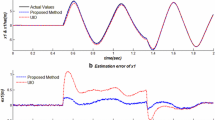Abstract
This paper is concerned with the problem of simultaneously estimating the state and the input of a linear discrete-time system. In order to improve the accuracy of estimation, a reasonable assumption about the unknown input is proposed. Based on this assumption, a modified input estimation is obtained, and then the optimal state estimation is derived strictly. Moreover, in order to effectively deal with the possible saltations of the unknown input, an adaptive estimation method is also developed. Simulation results illustrate the effectiveness and applicability of the proposed approach.




Similar content being viewed by others
References
B.D. Anderson, J.B. Moore, Optimal Filtering (Prentice-Hall, Englewood Cliffs, 1979)
J. Chen, R.J. Patton, Optimal filtering and robust fault diagnosis of stochastic systems with unknown disturbances. IEEE Proc. Control Theory Appl. 143(1), 31–36 (1996)
Y. Cheng, H. Ye, Y. Wang, D. Zhou, Unbiased minimum-variance state estimation for linear systems with unknown input. Automatica 45(2), 485–491 (2009)
M. Darouach, M. Zasadzinski, Unbiased minimum variance estimation for systems with unknown exogenous inputs. Automatica 33(4), 717–719 (1997)
J. Ding, J. Xiao, Y. Zhang, M.N. Iqbal, Distributed state estimation for discrete-time nonlinear system with unknown inputs. Circuits Syst. Signal Process. 33(11), 3421–3441 (2014)
H. Fang, R.D. Callafon, On the asymptotic stability of minimum-variance unbiased input and state estimation. Automatica 48(12), 3183–3186 (2012)
S. Gillijns, B.D. Moor, Unbiased minimum-variance input and state estimation for linear discrete-time systems. Automatica 43(1), 111–116 (2007)
S. Gillijns, B.D. Moor, Unbiased minimum-variance input and state estimation for linear discrete-time systems with direct feedthrough. Automatica 43(5), 934–937 (2007)
F.B. Hmida, K. Khmiri, J. Ragot, M. Gossa, Three-stage Kalman filter for state and fault estimation of linear stochastic systems with unknown inputs. J. Frankl. Inst. 349(7), 2369–2388 (2012)
C.S. Hsieh, Robust two-stage kalman filters for systems with unknown inputs. IEEE Trans. Autom. Control. 45(12), 2374–2378 (2000)
C.S. Hsieh, On the global optimality of unbiased minimum-variance state estimation for systems with unknown inputs. Automatica 46(4), 708–715 (2010)
C.S. Hsieh, State estimation for descriptor systems via the unknown input filtering method. Automatica 49(5), 1281–1286 (2013)
S. Jiang, H. Fang, F. Pan, Robust fault detection for nonlinear networked systems with multiple fading measurements. Circuits Syst. Signal Process. 34(9), 2873–2891 (2015)
P.K. Kitanidis, Unbiased minimum-variance linear state estimation. Automatica 23(6), 775–778 (1987)
J.Y. Keller, M. Darouach, L. Caramelle, Kalman filter with unknown inputs and robust two-stage filter. Int. J. Syst. Sci. 29(1), 41–47 (1998)
T. Kailath, A.H. Sayed, B. Hassibi, Linear Estimation, vol. 1 (Prentice Hall, Upper Saddle River, 2000)
Z. Luo, H. Fang, Y. Luo, Constrained state estimation for nonlinear systems with unknown input. Circuits Syst. Signal Process. 32(5), 2199–2211 (2013)
B. Li, State estimation with partially observed inputs: a unified kalman filtering approach. Automatica 49(3), 816–820 (2013)
F. Li, G. Zhao, J. Huang, Exact state estimation for linear systems with unbounded disturbances. Circuits Syst. Signal Process. 34(5), 1519–1533 (2015)
H. Pan, W. Sun, H. Gao, J. Yu, Finite-time stabilization for vehicle active suspension systems with hard constraints. IEEE Trans. Intell. Transp. 16(5), 2663–2672 (2015)
H. Pan, W. Sun, H. Gao, X. Jing, Disturbance observer-based adaptive tracking control with actuator saturation and its application. IEEE Trans. Autom. Sci. Eng. 13(2), 868–875 (2016)
D. Simon, Optimal State Estimation: Kalman, H Infinity, and Nonlinear Approaches (Wiley, New York, 2006)
J. Su, B. Li, W.H. Chen, On existence, optimality and asymptotic stability of the kalman filter with partially observed inputs. Automatica 53, 149–154 (2015)
W. Sun, H. Pan, H. Gao, Filter-based adaptive vibration control for active vehicle suspensions with electrohydraulic actuators. IEEE Trans. Veh. Technol. 65(6), 4619–4626 (2016)
H. Wang, J. Zhao, Z. Xu, Z. Shao, Input and state estimation for linear systems with a rank-deficient direct feedthrough matrix. ISA Trans. 57, 57–62 (2015)
S.Z. Yong, M. Zhu, E. Frazzoli, A unified filter for simultaneous input and state estimation of linear discrete-time stochastic systems. Automatica 63, 321–329 (2016)
Acknowledgements
The authors would like to thank the referees for their valuable and helpful comments which have improved the quality of the paper. This work was supported by the National Natural Science Foundation of China under Grant 61473127.
Author information
Authors and Affiliations
Corresponding author
Appendix
Appendix
Proof of Theorem 1
In order to prove the invertible of \({\tilde{R}}^*_{k}\), by (36), we only need to prove that \((I_m-C_k{G_{k-1}}K^d_{k-1} M_{k})\) is invertible. To do this, it is only need to show that all the eigenvalue of \((I_m-C_k{G_{k-1}}K^d_{k-1} M_{k})\) are not equal to zero. Let the singular value decomposition of \({\tilde{R}}^{-1/2}_k C_k G_{k-1}\) be
where \(\varDelta _k\) is a diagonal matrix with order q, \(U_k\) and \(V_k\) are orthogonal matrices.
Then matrix \(C_k G_{k-1}\) and \(M_k\) can be expressed as
Then it follows that
This indicates that matrix \(C_k G_{k-1} K^d_{k-1} M_k\) contains all the eigenvalues of \(K^d_{k-1}\) as its own eigenvalues, and the rest \((m-q)\) eigenvalues are equal to 0. Denote the eigenvalues of \(K^d_{k-1}\) as \(\alpha _i\), \((i=1,\ldots ,q)\), then the eigenvalues of \(C_k G_{k-1} K_k M_k\) can be represented by \((\alpha _1, \ldots , \alpha _q, 0, \ldots , 0)\), where the number of 0 is \((m-q)\). Therefore, it is easy to show that the eigenvalues of \((I_m - C_k {G_{k-1}}K^d_{k-1} M_{k})\) are \((1-\alpha _1, \ldots , 1-\alpha _q, 1, \ldots , 1)\), where the number of 1 is \((m-q)\). By Lemma 1(ii), we know that \(0<\alpha _i<1\), \((i=1,\ldots ,q)\), this means that all the eigenvalue of \((I_m - C_k {G_{k-1}}K^d_{k-1} M_{k})\) is not equal to zero. Hence, matrix \((I_m - C_k {G_{k-1}}K^d_{k-1} M_{k})\) is invertible and therefore \({\tilde{R}}^*_{k}\) is invertible. \(\square \)
Rights and permissions
About this article
Cite this article
Ding, B., Fang, H. Adaptive Modified Input and State Estimation for Linear Discrete-Time System with Unknown Inputs. Circuits Syst Signal Process 36, 3630–3649 (2017). https://doi.org/10.1007/s00034-016-0475-4
Received:
Revised:
Accepted:
Published:
Issue Date:
DOI: https://doi.org/10.1007/s00034-016-0475-4




